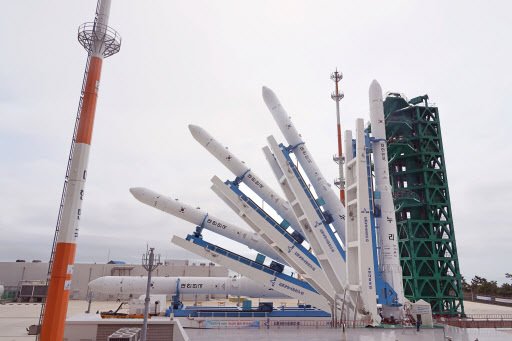 |
Work to erect the Korea Space Launch Vehicle-II (KSLV-II), also called Nuri, is underway for launch at the Naro Space Center in Goheung, South Jeolla Province, Wednesday. (Korea Aerospace Research Institute) |
The launch of South Korea's homegrown rocket Nuri has been indefinitely postponed due to technical glitches found during the final round of preparations before its planned launch on Thursday.
The Ministry of Science and ICT said Wednesday the Korea Aerospace Research Institute found a problem in one of the sensors in the oxidizer tank that measures the amount of oxidizer there.
According to KARI, the sensor was failing to point to the correct level of oxidizer in the tank.
“Once we acknowledged the problem around 2:15 p.m., the staff tried to find the source of the sensor error in the field. But it was difficult to identify the source with the rocket being held upright,” said Goh Jung-Hwan, director of the KSLV-II (Nuri) research and development directorate at KARI, during a press conference.
Goh said it is too soon to determine the cause of error at the moment because it was unsure whether the problem originated from the sensor, the cable that connects the sensor to the cable box, which sends the signal from the oxidizer tank, or the cable box.
The launch of rocket Nuri was already postponed once by one day to Thursday. The KARI also said it is uncertain if it could carry out the launch within the scheduled contingency date -- from June 16 to 23.
The Korean-made sensors, which need to be taken apart, might need longer time than expected to identify the exact problem, Goh said.
Should the launch fail again within the designated schedule, the government will notify the international community of the new launch dates.
Goh said the rocket was being transported to the assembly site for further analysis, and the launch committee will announce the new launch date.
With the cancellation of the launch, the 3-kilometer-parameter access ban around the launch site has been lifted as well.
Meaning “world” in Korean, Nuri is a three-stage, liquid-fueled carrier rocket weighing 200 metric tons and stands 46.2 meters tall. The first blastoff in October last year failed to put a dummy satellite into orbit.
By Byun Hye-jin (
hyejin2@heraldcorp.com)






![[Herald Interview] How Gopizza got big in India](http://res.heraldm.com/phpwas/restmb_idxmake.php?idx=644&simg=/content/image/2024/11/20/20241120050057_0.jpg)

